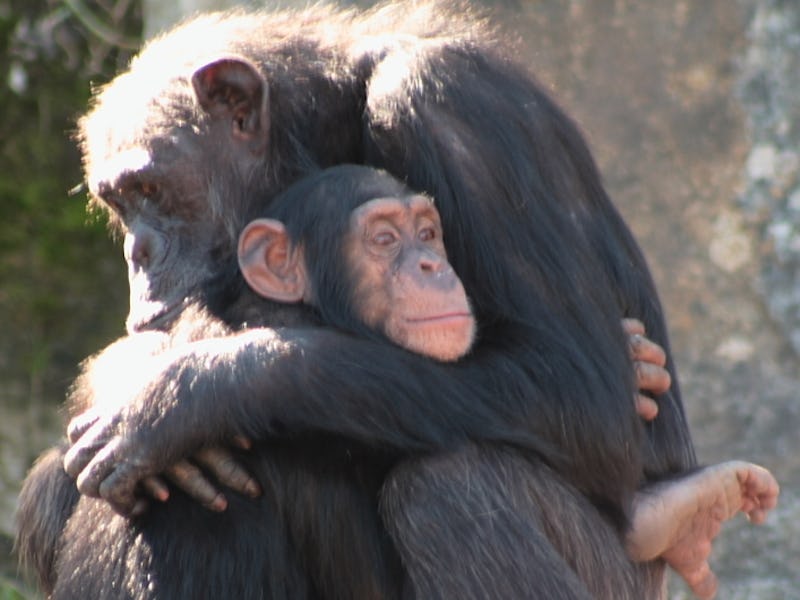Generous Chimps Prove That Humans Aren't Nature's Only Altruists
Chimpanzees will sacrifice themselves for their neighbors.

Humans often go out of their way to help other people, even if the payoff isn’t obvious. Whether the gesture is as simple as holding a door open for another person or as serious as risking their life to save another’s, Homo sapiens’s altruism is well documented. While we like to pat ourselves on the back, thinking that the willingness to help others while sacrificing ourselves is a uniquely human trait, new research on chimpanzees shows that our primate relatives can act pretty selflessly, too.
In a pair of studies published in the journal Proceedings of the National Academy of Sciences on Monday, researchers showed that chimpanzees will help each other, even in ways that aren’t immediately beneficial to the helper. The first study shows that chimps work collectively for the good of the group, even when it puts the individuals in that group at risk. In the second, researchers report that chimps will return favors at a personal cost, especially when they’ve seen another chimp do the same for them. Together, these studies shed light on how deep the evolutionary roots of our own social behavior may run.
Chimps: Not overly concerned that individual team members aren't pulling their weight.
In the first study, author Kevin Langergraber, assistant professor of human evolution and social change at Arizona State University, examined the territory-patrolling habits in a group of wild chimps. Specifically, Langergraber and his team wanted to know why chimpanzees bothered to exert themselves and put their lives at risk to scout the boundaries of their territory. These excursions, after all, are dangerous; if the group encounters rival chimps, it could mean a fight to the death. You couldn’t even say that the chimps were putting family first. Because some of the patrollers weren’t related, the authors point out that the apes’ behavior doesn’t fit the notions of kin selection theory, which posits that family relationships motivate members of a group to protect and serve each other. And yet, they all engaged in a dangerous effort that strengthened the group as a whole.
At the heart of this puzzle was a central question about group behavior: How can collective action evolve when individuals benefit from cooperation, regardless of whether they pay its participation costs? In other words, if a member of a group will benefit from others’ efforts no matter what, what’s keeping this member from taking a free ride on the labor and benefits provided by the other members of the group?
The behavior of the chimps led the researchers to suspect that a phenomenon called “group augmentation,” not kin selection, was at play. In group augmentation theory, what’s good for the health of the group is ultimately good for the individual, meaning that some sacrifice from each member will ultimately result in the group growing larger and becoming safer.
“Free-riders may increase their short-term reproductive success by avoiding the costs of collective action,” Langergraber’s team wrote, “but they do so at the cost of decreasing the long-term survival of the group if it fails to grow or maintain its size; nonparticipants suffer this cost alongside the individuals they had cheated.” In short, if a member of the group doesn’t pitch in, they’re ultimately hurting themselves.
This dynamic of self-sacrifice in the name of other chimpanzees was demonstrated in the other study, also published Monday in PNAS. In the second study, led by author Martin Schmelz, a researcher at the Max Planck Institute for Evolutionary Anthropology, pairs of chimps played a decision-making game to test how self-serving they were. The chimps took turns pulling one of four cords that led to four possible outcomes: one that skipped their turn and passed the choice to the partner, one that brought the cord-puller banana treats, one that gave their partner the banana treats, or one that gave both chimps treats. Anyone who expected the chimps to act selfishly was in for a surprise.
In this study, chimps could either get food for themselves, get food for a partner, get food for both, or pass. When chimps observed a partner pass, they were much more likely to forgo a large treat to help their partner.
In the most notable of the three experiments in this study, one chimp was trained to give up her turn, allowing her pal to make a decision for both of them. Turns out that the chimp who had just observed the other handing over the opportunity to make the choice most often chose the cord that resulted in both of them getting treats.
What this shows is that chimps understand what it means to return a favor: They were much more likely to choose the option that benefited their partner when they knew that their partner was willing to help them. This surprising awareness of group dynamics helps to explain the motivations behind the results of the first study — perhaps groups are held together by countless quid pro quos — and lends credence to the notion that chimps have more advanced notions of interdependence, cooperation, and sacrifices than we think.
“This finding suggests that some of the key motivations crucial to human cooperation may have deeper phylogenetic roots than previously suspected,” wrote Schmelz and his team, suggesting that social behavior among chimpanzees could give us clues to the roots of our own.